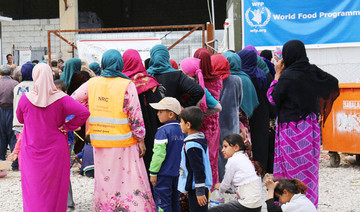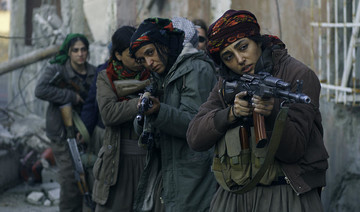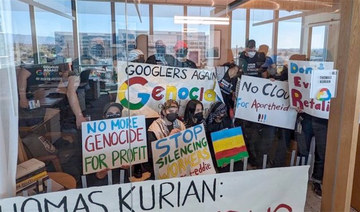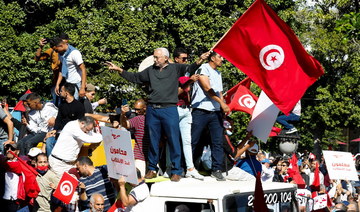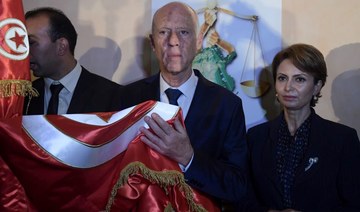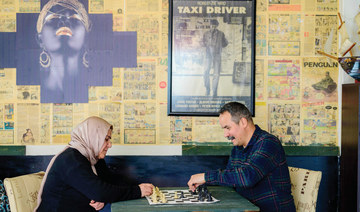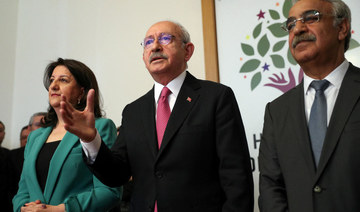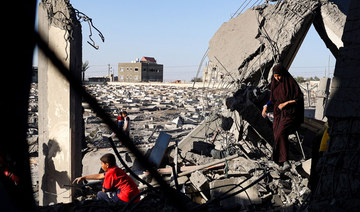IRBIL, Iraq: Smiling proudly, Zilan Serwud welcomed hungry customers swarming her newly-opened food truck in Kurdish Iraq. But launching the venture required more than just permits and loans: Serwud needed family approval.
Lingering societal prejudice, family pressures and an under-developed private sector have constrained women from breaking into the Iraqi workforce, including in Kurdistan.
That didn’t stop 22-year-old Serwud.
She launched Zee Burger in the regional capital Irbil last month, offering no-fuss fare of burgers, fries and onion rings served at small wooden tables.
The journey to get there was nowhere near as simple.
The first step to any female-run business, said Serwud, was convincing relatives the venture would not be looked down on by the Muslim-majority, conservative society.
“I heard some people say: ‘she has a father and brother, why should she run the restaurant?’” Serwud said.
“But if you have an idea or want to develop yourself, you should not listen to hearsay.”
Her family gave its approval, and she received funding from the German development agency (GIZ) to purchase mobile kitchen equipment.
Serwud’s father helped pick out the kitchenware and her brother Bayad even flips burgers part-time in the yellow-and-purple food truck.
“I am super happy now that I have my own business. I feel I’ve obtained my freedom and am showing everyone, this is what I am capable of,” said Serwud.
In Iraq, only 15 percent of working-age women are in the labor force, one of the lowest rates in the world, according to a 2018 demographic survey by the regional government.
Among employed women in Kurdistan, up to 75 percent work in the public sector, making female entrepreneurs an especially rare breed.
The biggest obstacle is defamation by conservative elements of Iraqi society who see economically-autonomous women as too liberal or even promiscuous.
“What actually destroys women in our society is the word ‘shameful’,” said Diman Fatah, 59, who opened Irbil’s first female-run plant nursery and chairs a botanical club with 450 members, including 25 women.
“Women are afraid to innovate or develop themselves because of what other people might say about them,” said Fatah.
Some recent comments on the Facebook pages of female-led businesses described the owners as “silly” and insisted that “women are responsible for work at home.”
But through solidarity and persistence, a gradual shift has become noticeable.
Besides caring for literal buds, Fatah’s club helps women-led ventures flourish by encouraging owners to “be confident.”
“Don’t give up and don’t be silent about your rights,” she urges peers.
“When a woman starts her own business in our society, she does not only earn money. She raises awareness about equality and paves the way for other women to enter the market and obtain their freedom,” she said.
A 2013 United Nations survey found that 66 percent of Iraqi youth support the right of women to work, compared to just 42 percent among the elderly — a marked generational improvement.
Avan Jaff, a female Kurdish labor activist who publishes online testimonies of women entrepreneurs, said she had noticed a shift, too.
“It is not because society has become open-minded all of a sudden,” said Jaff.
“Yes, some have become more tolerant, but the rest realized that women are resilient and do not give up in pursuing their passion. They think their comments are not effective anymore, so they don’t engage,” she explained.
Still, a host of challenges remain.
In practice, some Iraqi laws prohibit women from working in particular industries that require physical labor or overnight work.
Women workers who go on maternity leave in Kurdistan are not guaranteed their positions when they return, and many who do start ventures are pressured to cede some decision-making to their male relatives.
“It is the family who decides how to spend the profit or where they should invest, not the women,” said Jaff.
About 100 kilometers (60 miles) east in the city of Rania, Shawnem Hussein’s Sky Fitness health center boasts 150 female subscribers.
Members dance Zumba and share stories.
“These women are not coming only to work out, but also to mingle, chat with other women and talk about their problems,” said Hussein.
One of them, a gym member who asked to remain anonymous, said seeing the success of Sky Fitness had fed her own dreams of opening a restaurant in her hometown.
But, in a sign of the enduring conservatism in some parts of Kurdistan, her husband swiftly shattered her hopes.
“He told me, the day you open the restaurant will be the last day you come home,” she said.
For Kurdish Iraq’s women entrepreneurs, persistence pays off
For Kurdish Iraq’s women entrepreneurs, persistence pays off
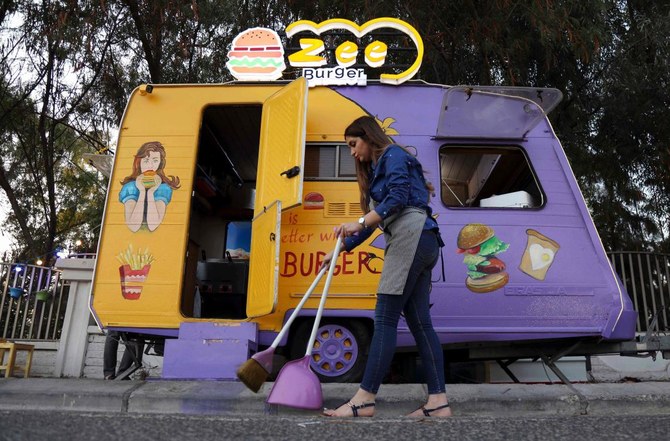
- Lingering societal prejudice, family pressures and an under-developed private sector have constrained women from breaking into the Iraqi workforce
- In Iraq, only 15 percent of working-age women are in the labor force
UAE announces $544m for repairs after record rains
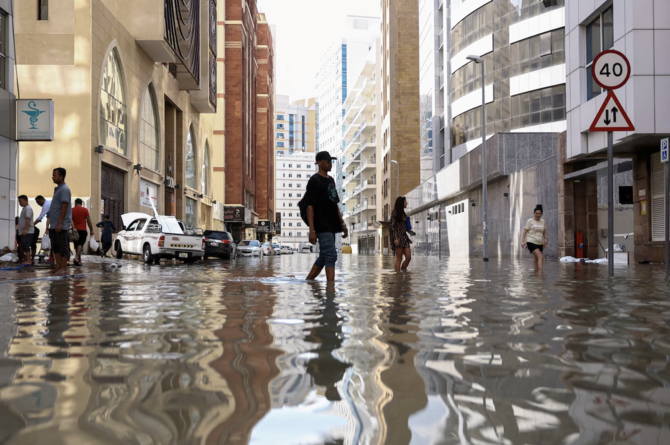
- Wednesday's announcement comes more than a week after the unprecedented deluge lashed the desert country
- “The situation was unprecedented in its severity but we are a country that learns from every experience,” Sheikh Mohammed said
DUBAI: The United Arab Emirates announced $544 million to repair the homes of Emirati families on Wednesday after last week’s record rains caused widespread flooding and brought the Gulf state to a standstill.
“We learned great lessons in dealing with severe rains,” said Prime Minister Sheikh Mohammed bin Rashid Al-Maktoum after a cabinet meeting, adding that ministers approved “two billion dirhams to deal with damage to the homes of citizens.”
Wednesday’s announcement comes more than a week after the unprecedented deluge lashed the desert country, where it turned streets into rivers and hobbled Dubai airport, the world’s busiest for international passengers.
“A ministerial committee was assigned to follow up on this file... and disburse compensation in cooperation with the rest of the federal and local authorities,” said Sheikh Mohammed, who is also the ruler of Dubai, which was one of the worst hit of the UAE’s seven sheikhdoms.
The rainfall was the UAE’s heaviest since records began 75 years ago.
Cabinet ministers also formed a second committee to log infrastructure damage and propose solutions, Sheikh Mohammed said in a post on X, formerly Twitter.
“The situation was unprecedented in its severity but we are a country that learns from every experience,” he said.
The storm, which dumped up to two years’ worth of rain on the UAE, had subsided by last Wednesday.
But Dubai faced severe disruption for days later, with water-clogged roads and flooded homes.
Dubai airport canceled 2,155 flights, diverted 115 and did not return to full capacity until Tuesday.
Israeli army strikes 40 Hezbollah targets in south Lebanon
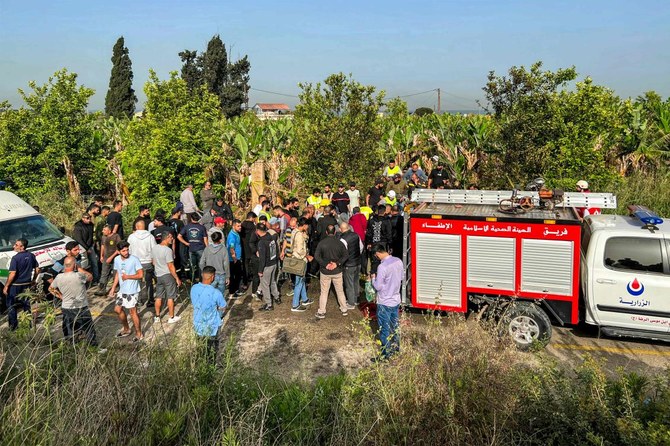
- Hezbollah has exchanged near-daily fire with the Israeli army
- Israel says 11 soldiers and eight civilians have been killed on its side of the border
Beirut: The Israeli army said Wednesday it struck 40 Hezbollah targets in southern Lebanon as near-daily exchanges of fire rage on the border between the two countries.
“A short while ago, IDF (army) fighter jets and artillery struck approximately 40 Hezbollah terror targets” around Aita Al-Shaab in southern Lebanon, including storage facilities and weaponry, the army said in a statement.
Lebanon’s Iran-backed Hezbollah movement said it fired a fresh barrage of rockets across the border earlier in the day after a strike blamed on Israel killed two civilians.
The group had already fired rockets at northern Israel late on Tuesday “in response” to the civilian deaths.
Hezbollah has exchanged near-daily fire with the Israeli army since its ally Hamas carried out an unprecedented attack on Israel on October 7, triggering war in Gaza.
It has stepped up its rocket fire on Israeli military bases in recent days.
Hezbollah fighters fired “dozens of Katyusha rockets” at a border village in northern Israel “as part of the response to the Israeli enemy’s attacks on... civilian homes,” the group said in a statement.
On Tuesday, rescue teams said an Israeli strike on a house in the southern village of Hanin killed a woman in her fifties and a girl from the same family.
Since October 7, at least 380 people have been killed in Lebanon, mostly Hezbollah fighters but also 72 civilians, according to an AFP tally.
Israel says 11 soldiers and eight civilians have been killed on its side of the border.
Tunisia law professors call for release of detained opposition figures
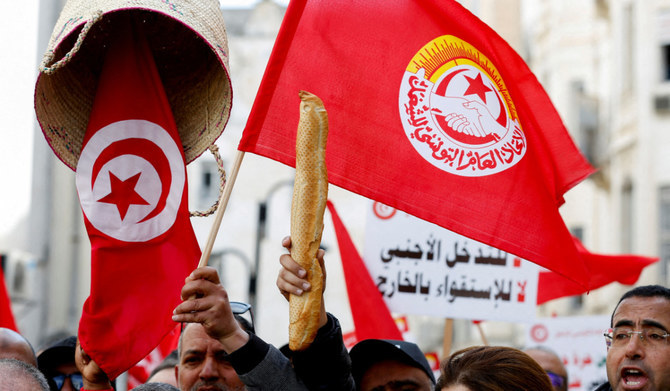
- Since a flurry of arrests in February 2023, around 40 critics of President Kais Saied have been facing charges of “conspiracy against the state“
- Eight of the critics have been detained since, and have yet to see trial
TUNIS: More than 30 Tunisian law professors on Wednesday called for the release of several political opposition figures arrested last year, pointing out that the 14-month legal limit for pre-trial detention had passed.
Since a flurry of arrests in February 2023, around 40 critics of President Kais Saied have been facing charges of “conspiracy against the state.”
Eight of the critics have been detained since, and have yet to see trial.
They were expected to be released earlier this month after their detention was extended twice — four months each time — following an initial six-month stint, their lawyers said.
Yet all eight remain in detention after a court hearing on their case was put off until May 2.
This means they have been detained for more than 14 months without trial, which is the limit under Tunisian law.
“Keeping them in prison beyond the period of preventive detention is a violation (of Tunisian law),” read a statement signed by 33 law professors, including three deans.
The professors said the eight must be released, accusing the Tunisian authorities of putting them in what they called “forced detention.”
The country’s anti-terrorism court is investigating the political opponents for trying to “change the nature of the state” under Tunisia’s penal code.
In a letter addressed to President Saied last month, rights group Amnesty International called for the “immediate and unconditional” release of the detainees.
“I call on you to cease your targeted arrests of critics for the peaceful exercise of their rights to freedom of expression,” the letter read.
Saied, a former law professor, has ruled by decree since orchestrating a sweeping power grab in July 2021 in Tunisia, which saw the onset of what came to be known as the Arab Spring a decade earlier.
The eight detainees include former Islamist-inspired Ennahdha party figure Abdelhamid Jelassi, co-founder of the left-wing National Salvation Front coalition Jawhar Ben Mbarek and political activist Khayam Turki.
After the wave of arrests last year, the United Nations voiced alarm over “the deepening crackdown against perceived political opponents and civil society in Tunisia, including attacks on the independence of the judiciary.”
Critics have denounced Saied’s crackdown on opponents, accusing him of exploiting Tunisia’s judiciary as the country prepares for presidential elections set to take place later this year.
Turkish minister warns pro-Kurdish party it could face moves to ban it
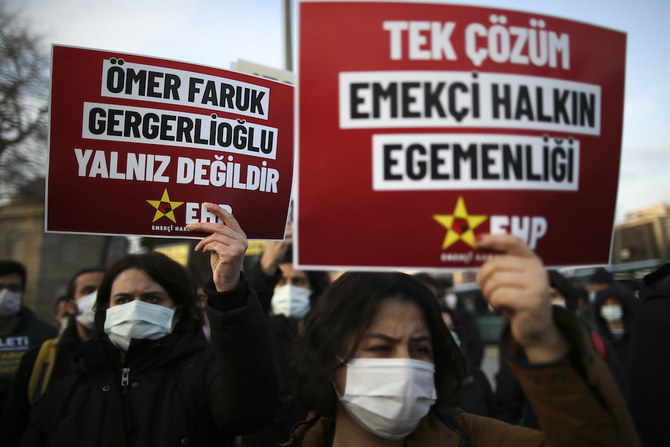
- “In the past, closure cases were opened against parties for supporting terrorism,” Justice Minister Yilmaz Tunc told reporters in Ankara
- “Therefore, we say that if the DEM Party follows the same path, then it will face the same treatment”
ISTANBUL: Turkiye’s justice minister warned the country’s main pro-Kurdish DEM party on Wednesday that it would face the risk of legal action, and even a closure case like its predecessor, if it did not distance itself from Kurdish militants.
DEM, parliament’s third largest party, was established last year as a successor to the Peoples’ Democratic Party (HDP), which is facing the prospect of closure over alleged militant links in a court case following a years-long crackdown.
“In the past, closure cases were opened against parties for supporting terrorism,” Justice Minister Yilmaz Tunc told reporters in Ankara, noting that some parties had been banned and that other cases were ongoing.
“Therefore, we say that if the DEM Party follows the same path, then it will face the same treatment,” he said. “We say keep your distance from terrorism if you do not want to face such a legal process.”
Another court had been expected to announce a verdict this month in a case trying jailed former HDP leaders and officials over 2014 protests triggered by a Daesh attack on the Syrian Kurdish town of Kobani. That verdict was postponed.
“They should not wag their fingers at us. I repeat, the policy of closure, blackmail and threats is over,” DEM Party co-chair Tuncer Bakirhan said on Wednesday in the wake of a call from a government ally to ban the DEM Party.
Critics say Turkish courts are under the influence of the government and President Tayyip Erdogan, which he and his AK Party (AKP) deny.
Both prosecutors and the government accuse the HDP of ties to the militant Kurdistan Workers Party (PKK), which is deemed a terrorist group by Turkiye, the United States and European Union. The HDP denies having any connections with terrorism.
The PKK launched an insurgency against the Turkish state in 1984 and more than 40,000 people have been killed in the conflict. A peace process between Ankara and the PKK fell apart in 2015 and in a subsequent crackdown on the HDP thousands of its officials and members have been arrested and jailed.
UAE, Bahrain call for joint work to contain tensions threatening regional stability
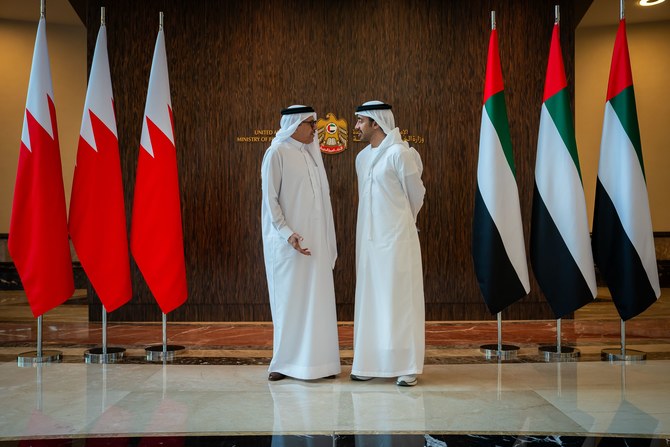
- During a meeting in Abu Dhabi, the ministers discussed the fraternal relations between UAE and Bahrain
DUBAI: UAE Minister of Foreign Affairs Sheikh Abdullah bin Zayed Al Nahyan received his Bahraini counterpart Dr. Abdul Latif bin Rashid Al Zayani in Abu Dhabi on Wednesday.
Sheikh Abdullah bin Zayed welcomed the Bahraini Foreign Minister, and during the meeting held at the ministry’s headquarters in Abu Dhabi, they discussed the fraternal relations between the two countries, and ways to enhance Emirati-Bahraini cooperation at various levels, WAM reported.
Sheikh Abdullah stressed during the meeting that the UAE and Bahrain are linked by historical relations that are becoming more established, developed and growing, and that they also constitute an important tributary to joint Gulf and Arab work.
He also stressed that the current challenges facing the region require intensifying cooperation, coordination and joint work to contain all tensions that threaten its stability, security and safety of its people.



